
25 minute read
From the State Vet’s Office
You Can’t Spell Pandemic Without the Word Panic
In my nearly six decades on earth, I think I have learned a few things that have served me well. At least they have got me to this point in my life in reasonably decent shape. One of those is that during an emergency or crisis, after taking care of life and limb, is that sometimes the best thing to do is nothing. At least, to just stop and assess the situation and not make decisions in haste that may carry consequences farther down the road that may not look that wise after the wind stops blowing and the sun starts shining again. Someone recently related to me that a common way many people approach a crisis is, “When in doubt, run in circles. Scream and shout.” During our pilgrimage through this very real coronavirus outbreak, I have absolutely seen people at their very best. To see people helping their neighbors who have lost jobs or even helping people who they don’t know during these challenging times has made me proud to be part of the human race. But when I think back to mid-March when people were hauling cases of toilet paper out of the stores as if there would never be another roll of TP produced, it kind of makes me wonder. Then in late April and early May, there was the perceived meat shortage. The same group of people who have stacks of toilet paper in their spare bedroom were going out and buying a freezer so they could load up on a few months’ supply of ground beef.
Advertisement
Well, I am no expert on toilet paper. About as close as I come is that the paper mill where my daddy used to work makes toilet paper now. But I do know a little about meat production and I am more than a little concerned at some of the misinformation out there about food production, especially poultry and beef. I don’t really blame people who have no idea about what is really going on stocking up on a few extra packages of ground beef. If I really thought I couldn’t find meat at the grocery store for some indefinite period, I might tend to throw an extra pound or two in my shopping cart.
I am concerned when I hear some national news reporter say, “You had better buy your beef this week because it will cost you twice as much next week … if you can even find it.” I haven’t been to the grocery store
myself in a while, but I understand that some grocery the cattle through the food chain. Accommodations chains had to put up signs that limited the amount of are being made as I am writing this article to make sure ground beef you could buy. Sometimes things like this meat plants can operate with safety concerns for the may tend to feed the feeling of panic, just like seeing the workers and exposure to the virus reduced. toilet paper shelves at Walmart completely empty can But that brings me to the point of this article. In make a person conjure up some unpleasant images! times of crises, when ground beef goes to $5 a pound
Let me be clear that the coronavirus has exposed with some more upside predicted and shelves becomsome vulnerabilities in the food supply chain. We have ing less full of choices of meat, I can understand peobecome so efficient in our ability to process and disple’s desire to do something to make sure we have tribute meat and other agricultural products that when plenty of beef, chicken and pork chops for the summer supply and demand changes, it takes a little time for grilling season. One such action is the renewed interthe food chain to react. One example is that restaurants est in passing the PRIME Act. The PRIME (Processing were, until the great lockdown, large customers of ag Revival and Intrastate Meat Inspection) Act was introproducts. Many of the meat packing plants, dairies and duced June 2019. The bill that was introduced to Coneven fresh fruit and vegetable processers are geared up gress could in some circumstances allow meat that had to package and ship to large restaurant chains. Known not been inspected to be sold from custom slaughter as HRIs, hotels, restaurants facilities within state lines. and institutions, these cusWith the large slaughter tomers were either closed or at least greatly reduced in the Let me be clear that the facilities across the country experiencing workforce isvolume of agriculture prodcoronavirus has exposed some sues and the production line ucts they bought. A good example is that schools purchase a huge volume of the vulnerabilities in the food supply chain. We have become speed either being dramatically reduced or even shut down, some people looked milk produced in the United States. Most of that milk was sold in the half pint cartons so efficient in our ability to process and distribute at the use of custom slaughter facilities as an answer to keep the grocery meat that we have grown to know. While it is not impossible, you cannot just change that meat and other agricultural products that shelves full. The processing of animals for custom use is when you take a steer or packaging to gallons and when supply and demand pig that you have raised to half gallons overnight to accommodate the consumers changes, it takes a little time a custom facility and then put the beef or pork in your whose kids are unexpectedfor the food chain to react. freezer at home for personal ly at home for the rest of the consumption. To me there school year. The same goes are several issues that make for poultry that is processed this not such a good idea. and packaged for restaurants. It is shipped in larger conThe main issue is that uninspected meat would be gotainers than most of us at home would care to use or ing to the unsuspecting consumer. The meat industry may not have the freezer space to accommodate – such has the confidence of most consumers that they are as hundreds of pounds of chicken breast, leg quarters or buying a wholesome, safe, inspected product. While thigh quarters. So, the logistics of packaging and shipmost shoppers may not notice the inspection label, ping had to be revamped, which took some time. I think most assume and expect it has been inspect
Obviously, the coronavirus itself contributed to ed. Also, there would be no incentive for an inspected the slowing of processing lines and even the closing plant to maintain inspection status. Lastly, our cusof meat and poultry plants. If you have ever seen the tom facilities are usually very small and are operatproduction lines at one of these plants, the 6-feet-apart ing at capacity now. Most of them have limited cooler social distancing was not figured into the design of the space and the workforce is usually the owners and plant by the engineers who planned it. By early May, family members. there were thousands of feedlot cattle that had not So, my advice during this time of potentially less been harvested as they normally would have been. This meat in the stores is to not panic. We will get through brought about a noticeable amount of uneasiness to to the other side. I am sure we will fix some of our disthe consuming public – not to mention a lot of uneasitribution issues and there will be enough meat to go ness to the feedlot owners who were not able to move around.
A note from our CEO on COVID-19 and the Cooperative
For over 83 years, Alabama Farmers Cooperative has demonstrated that we are resilient. We choose to face difficult situations head on and embrace them as opportunities to become even stronger. COVID-19 is one of the greatest challenges we have encountered. This pandemic abruptly threatened the infrastructure of agriculture and the economic landscape of our country. From the beginning, AFC has taken a proactive approach to managing the impact of COVID-19 on our business. We are committed to serving our customers with excellence while remaining healthy and strong.
I have never been prouder of our leadership team than I am today. They have done everything possible to combat the effects this pandemic has had on our daily operations. Our team has leveraged this time to discover innovative ways to better support our staff and serve our customers. Together, we will do whatever it takes to fulfill our mission and prevail.
As an essential business, our doors have remained open throughout the pandemic. However, part of our team is working remotely which has revealed the critical need for connection with one another. We have maximized this as an opportunity to expand and improve the ways we communicate and appreciate one another. As a result, we have gained valuable insight to carry with us as we move forward. Once we are together again, I am confident each of us will feel an even deeper appreciation for everyone in our AFC work family and community.
In the meantime, we are enjoying the slower pace that comes along with quarantined life – family dinners at night and kids playing outside until sunset. It reminds me of my childhood in the Mississippi Delta. It is grounding to take a break from the hustle and bus tle of life and reprioritize what really matters most – our family, our friends and the people we ser ve.

Alabama F armers Cooperative is committed to serving farmers and the agriculture community wholeheartedly – not only when it is easy but especially when it is challenging! I am honored to lead this organization and take great pride in our team’s resilience, can-do attitude and lo yalty to those we serve. That is what sets us apart and makes AFC great. Watch us win together!
- Rivers Myres, President and CEO

Co-op, COVID & Community
BY JESSIE SHOOK

Quality Co-op, Inc. Greenville, Alabama
Quality Co-op, Inc. is proud to be a sponsor of a special community project honoring the Class of 2020 with senior posters that line the downtown streets of Greenville. The Co-op also showed their appreciation for local linemen during the month of April for National Lineman Appreciation month by serving up some fried catfish plates for linemen in their community.


Farmers Cooperative, Inc.
Live Oak, Florida
Farmers Cooperative joined the community parade driving by Surrey Place Care Center and Suwannee Health Care and Rehabilitative center.
Morgan Farmers Cooperative
Hartselle, Alabama
Morgan Farmers offered curbside service and athome delivery during this pandemic.
“We felt the best way to help our customers was to feed our employees daily during these stressful times so they didn’t have to worry about the cost or the struggle of getting a meal. This ensured our employees could serve our farmers to the best of their capability daily by having a much needed lunch break and time to rest each day. We are sincerely thankful for the overwhelming amount of support that the community has given us during this time. We would like them to know how grateful we are for their business.” – Lance Ezelle, General Manager
St. Clair Farmers Cooperative
Pell City, Alabama
“We have been practicing social distancing by only allowing six customers in our store at a time. Customers have been very patient and have been utilizing phone orders. We also sent out graduation cards to high school seniors and have been supporting the wrestling team, archery team, baseball team and softball team throughout the year.” – Joseph Taylor, Manager
Limestone Farmers Cooperative
Athens, Alabama
Limestone Farmers Cooperative partnered with Limestone County grill team, Limestone County Farmer’s Federation and TriGreen Equipment to deliver ribeye sandwich plates to Athens-Limestone Hospital.
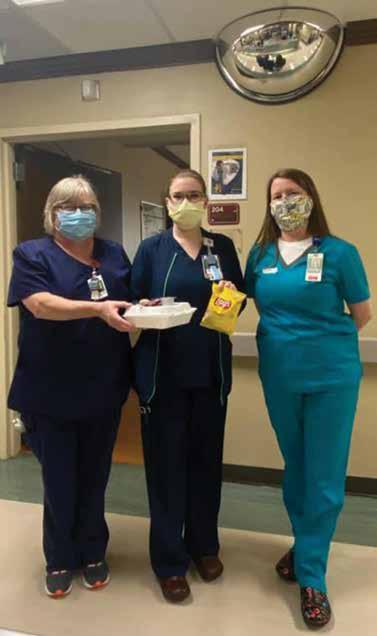
Andalusia Farmers Cooperative
Andalusia, Alabama
“We closed the store front and opened a walk-up ‘window’ which allowed us to keep both customers and employees safe at a distance. We also practiced ‘safe separation’ of agronomy services and retail services at both our Andalusia and Florala locations – keeping the employees safer.” – Russell Lassiter, General Manager

SouthFresh Aquaculture, LLC.
Health care workers are making sacrifices to keep the community healthy every day during this pandemic and with the help of half a dozen area businesses, SouthFresh helped show their appreciation by serving lunch to 400 doctors, nurses and first responders at Whitfield Regional Hospital located in Demopolis, Alabama.
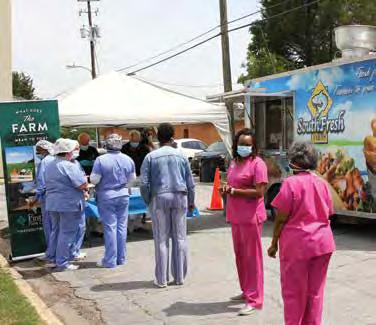
New Market Agricultural Supply: A New Face in the Co-op Family
STORE SPOTLIGHT


BY COREY ESPY
Although New Market Ag is new to the Co-op, it has roots in the New Market community that were planted many years ago. The business was originally started in 1962 by William “Billy” Gray. It began as a small operation selling chemicals, seed and fertilizer out of a small corner of a former dairy barn. The business soon expanded to include a full hardware supply store and converted the entire barn into a showroom. It is said that Gra y would routinely sit under a tree in the front yard of a house right in front of the store and when people would stop to talk, he would end up selling them something when they had no original plan to buy anything. Through his salesmanship and forward thinking, he continued to expand the business and began sellMembers of the Gray family ing and constructing metal buildings, grain bins, tractor implements and any type of hardware that might be needed on a farm. His dedication also made sure that the store would have what you needed when you needed it. If a customer came in and asked for something that the store did not have, Gray would order 10 of that item to make sure they would have it for the next customer. Throughout the years, the store became a local hangout for farmers and anyone who wanted to know the local gossip. This sense of community helped build a strong tie that reached far beyond the small New Market area. Although the store was never advertised in a traditional sense such as taking out ads in newspapers, people fr om surrounding states would come to shop at New
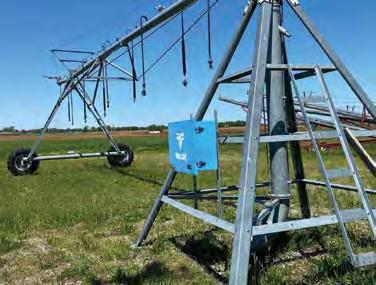
Market Ag because the store would be recommended through word-of-mouth that whatever the individual needed, he or she could find it at New Market. This also helped the store further to expand by allowing the addition of Valley Irrigation systems. This made New Market Ag the only Valley dealer in the state, which is still true today. According to Gray’s wife, Mary, this really catapulted the business. The success of the store continued thr ough the years. Unfortunately, Gray passed away in 2011 and the business was kept running by the employees and his children who run their own businesses in the Birmingham area. After a few years of running businesses in separate parts of the state, the decision was made to sell New Market Ag in September 2019 to Madison County Cooperative.
We at the Co-op are proud to carry on the legacy at New Market Ag and hope to keep the same sense of family, community and hard work that has kept the store running strong for 58 years.
5 Years

10 Years

William Stevens, Rivers Myres (CEO), Wesley Warren, Priscilla Hathcoat (Not pictured: James Dilts, Kenneth Wiggins)

15 Years
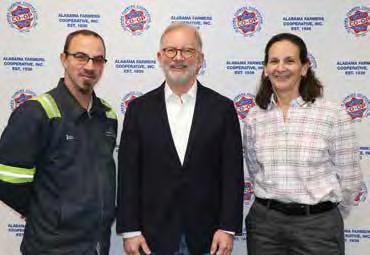
Ben Waple, Rivers Myres (CEO), Cheryl Cornman

20 Years
Chuck Cobb, Paula Worthey, Rivers Myres (CEO), Donna Solomon, John England Rhonda Herring, Rivers Myres (CEO) (Not pictured: Susan Smith)
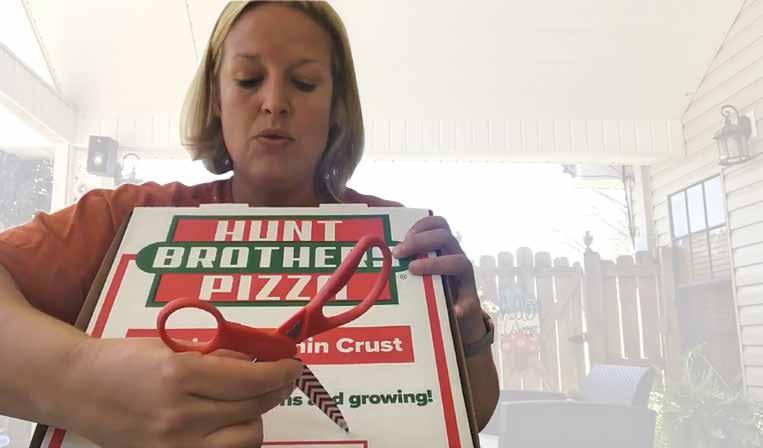
The Most Important Things ...
For Karla Robinson, thinking outside the box comes naturally.
Karla Robinson taught first grade for 14 years before moving into her current job as 4-H Foundation agent for Conecuh and Monroe counties. Finding ways to reach and teach children comes naturally to Robinson, so when she faced a nonideal situation, she used what she had on hand to offer something for everybody.
To meet the needs and interests of her 4-H’ers, Robinson made videos that showed easy, hands-on activities the children could enjoy. She often invited community members to help. One unusual activity was a 19-day

Karla Robinson made videos that showed easy, hands-on activities that kids could enjoy while learning. Her popular videos have been shown all over the state of Alabama.
“Photo Scavenger Hunt.” Each day, Robinson invited 4-H’ers to record common things in an uncommon way. She encouraged them to be inventive, creative and resourceful, and then post their results online. The top winners were recognized daily. Even though these activities were designed to keep children occupied while learning, Robinson had other benefits in mind also. For example, while these fun activities got children outdoors, they
In the Perception Challenge, Jud Robinson presented quite an interesting view. It shows how the eye can be fooled. The picture was taken to look as if the boy in the distance is actually holding up a large ball.

Michael Jo and Paul Mason, of Moundville, enjoyed the xylophone video so much that they made their own. This was one of the music videos offered on rainy days.
Emma Padgett participated every day of the Scavenger Hunt. Here, she found a creative way to show her “upside-down” challenge.
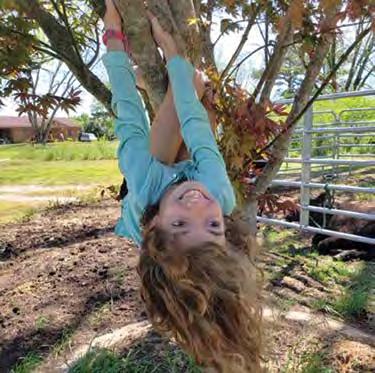
also taught photography, being observant and paying attention to tiny details all around them.
“I wanted my 4-H’ers to spend time with their families, finding the unique representation of each daily item,” Robinson said, “and then take a picture of that item at an unusual angle. I hoped they could find beauty in everyday items!”
Robinson was amazed at the responses. It didn’t take long before others noticed as well and, soon, the popular videos were shown statewide.
Simplicity and enjoyment were the allure for each video. Robinson’s ingredient lists were never complicated, usually calling for only three or fewer items, so parents could use what they had at home and not have to buy anything. In fact, Robinson soon discovered that children and their parents were working together, enjoying these activities as a family.
“I tried to make simple, down-home videos that take us back to what’s important,” Robinson explained. “I was delighted if family members helped or joined in!”
Robinson’s contagious enthusiasm and her passion for helping children encouraged 4-H’ers to step outside their comfort zones. One example was “Let’s Grow Socks!” Here, Robinson invited students to slip on a pair of old socks, run through mud puddles in their yards and then walk around the yard for a while, looking at all the things growing there. She then asked the children to remove their socks, put them in a resealable plastic bag
Using Newton’s First Law of Motion, Karla Robinson took a card, some pennies and a glass to demonstrate the force of gravity. This was one of her STEM activities.

and hang them in the sun to see what would happen. In three to five days, students saw little plants growing on the socks. In 14 days, the plants had germinated enough to identify. This activity took the children back outside to match them with larger plants growing in their yards. Plant germination, seed identification and gardening had never been so much fun!
Many videos involved STEM activities. Using Newton’s First Law of Motion, Robinson took a card, some pennies and a glass to demonstrate the force of gravity. She manipulated the center of gravity with a toothpick, a spoon, a fork and a glass in “Center of Motion.”
“I tried to add tidbits of knowledge without bogging them down,” she explained. “I wanted to fill the gaps in their classroom learning!”
Robinson wisely chose activities with dual benefits. For example, to encourage public speaking, she created “It’s Magic!” After showing simple magic tricks and then giving the secrets behind each one, she encouraged each child to plan and post his/her own magic show for

Neil Thomas and Morgan Miller, of Tuscaloosa County, enjoyed a scavenger hunt with their goats and guard dogs.

the family. Speaking in public this way was much more exciting.
Weather always played a big role in each video. Robinson paid close attention to forecasts and planned accordingly. If rainy days were coming, she engaged students in art or music activities (but always with a twist). If a full moon was on the horizon, Robinson explored stargazing and constellations. On clear days, she invited her followers to dig for worms, fish with a cane pole, learn to bait a hook or try jack fishing. If it was hot outside, she cooked s’mores in a pizza box!
Robinson’s videos have gained widespread attention for their creative originality, as well as their emphasis on science, healthy living, civic engagement and leadership.
Her most popular video, “Cane Pole Fishing,” had 4,800 hits. “Digging for Worms” has been viewed 2,300 times and shared 70 times. Over 2,250 viewers tuned in
Abbie Grace Holley participated in the “Weird and Unusual” pet category with her pet goat.
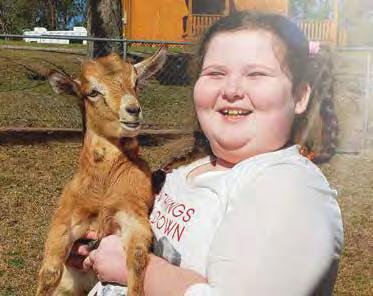
to “Solar Energy” as Robinson created a solar oven from an old pizza box. Many parents messaged her personally to share how excited they and their children were with each activity.
“I wanted to help children.” Robinson added, “4-H is for everyone, so I wanted a wide range of activities to cover everybody. If a child is interested in something, 4-H has a program for that!”
By rethinking the classroom, Karla Robinson has met both the needs and interests of 4-H’ers throughout Alabama. With her homespun videos, she has made learning challenging, but fun!
“If nothing else comes out of this,” Robinson mused, “involving the family and being together were most important!”
Check out Karla Robinson’s educational videos at Alabama 4-H or Conecuh County 4-H on Facebook.


Pine Level Elementary Joins Clean Campus Program
Before the COVID-19 pandemic, I was able to get out and visit Pine Level Elementary. They have been a member of the Clean Campus Program for several years and have done a wonderful job keeping their campus and community litter-free! Each year when I visit, it is easy to sense the pride these students take in maintaining a clean campus!
About a month after I visited the Pine Level Elementary campus, I was working the Autauga County Water Festival and saw several of the fourth graders that had seen my presentation at their school. At the water festival, they learned even more about how litter and pollutants travel in water. We discussed the water cycle and performed two experiments to go along with the discussion. One experiment shows how litter moves along ditches and streams when it rains and the other one shows how even one small drop of food coloring can pollute several cups full of water. According to the Environmental Protection Agency, used motor oil from a single oil change can ruin a million gallons of fresh water. That’s a year’s supply of water for 50 people!
The students of Pine Level Elementary are well equipped to be the anti-litter leaders of the future. Is there a school near you that needs to hear the Clean Campus message? Please contact me if you would

like the students of your community to be a part of our movement! Our goal is for students to become lifelong stewards of the world around them. Give me a call or email to find out more at 334-263-7737 or jamie@alpals.org. As always, the Clean Campus Program is available to schools at no cost thanks to our corporate sponsors.

Meet Your State Staff
PART TWO
This month, we continue introducing you to the staff of the Alabama FFA Association and will focus on the seven district improvement specialists. These retired Ag teachers have a passion to help programs grow and bring their years of expertise to the table to further premier leadership, personal growth, and career success within the members of the Alabama FFA.
Barry Bailey
Director Alabama FFA Alumni
Dr. Barry Bailey grew up in Sand Rock, Alabama, on the family farm where he still resides. He graduated in 1985 from Auburn University and was blessed to teach 10 years at Collinsville High, just eight miles from home. Later, he taught at Sand Rock until his retirement in Alabama. He then spent two years in Gordon County, Georgia, and eight years in Chattooga County as a Georgia Young Farmer teacher, working mainly with adult farmers. He is now working as a program specialist with an emphasis on growing and maintaining the Alabama FFA Alumni. Barry and his wife, Jill, have three sons, all involved with agriculture, and seven grandchildren.

Chip Blanton
Regional Improvement Specialist-North District
Chip Blanton was an Ag teacher/FFA adviser for 37 years. The last 35 were spent at Fort Payne High School. While at Fort Payne, his chapter was active in the National Chapter Award program, String Band and many CDE activities. Floriculture, Nursery Landscape and Proficiency awards were some of the areas the Fort Payne Chapter was strongest on the state level. While at Fort Payne, he had the first American Degree winner in chapter history. In DeKalb County, the Fort Payne Chapter was strong in the Livestock CDE and Dairy. Fort Payne has had several District Star Farmers and MK Heath Award winners.
Blanton’s favorite part of being a Program Improvement Specialist is the people. He enjoys meeting the teachers and students and being able to help solve problems they might have on an application or with the AET record book.

David DeFoor Regional Improvement Specialist-North District
David DeFoor grew up in Russellville, Alabama, and graduated from Phil Campbell High School. He has obtained several degrees from Auburn University and enjoyed a 39-year

career in the classroom at both Smith Station and most recently East Lawrence County High School. DeFoor served the Alabama Association of Agricultural Educators for 10 years in multiple leadership positions. He is the proud recipient of both the State and American Honorary FFA Degrees. DeFoor and his wife, Roxanne, have two sons, Joshua and Jeffrey.
Stanley Clarke
Regional Improvement Specialist-Central District
Agriscience Education Improvement Specialist (Alabama - Central District) Stanley Clarke grew up in Delta, Alabama, where he was an active member of the Lineville FFA. After graduating from Auburn University, Clarke taught Agriscience at Lincoln High School for 15 years and served as principal/career technical director for Randolph County and Roanoke City Schools at Randolph-Roanoke Career Technology Center. Clarke has been retired for eight years and has worked as an Ag. Ed. Improvement Specialist for the last five years.
Willie Gholston
Regional Improvement Specialist-Central District

Willie Gholston is a native from Town Creek, Alabama, and attended Hazlewood High School where he was an active member of the local FFA chapter and lettered in several sports. After high school, Gholston attended Alabama Agricultural and Mechanical University. After obtaining his bachelor ’s degree from AAMU, he pursued and received a master’s degree and education specialist in Agribusiness Education.
Before becoming an Ag. teacher at Wilcox Central High School for 27 years, Gholston worked for the Tennessee Valley Authority and the Army Corps of Engineers as a Hydro Plant Operator. He became the West Central District Ag. Program Improvement Specialist in 2016. He enjoys working with teachers, motivating students and strengthening agriculture education. In his spare time, he loves playing with his grandkids, watching TV Westerns, baseball, basketball and football games.
Jack Harris
Regional Improvement Specialist-South District
Jack Harris grew up in Skipperville, Alabama, and was an active member of the G.W. Long FFA with the privilege of having Bob Moorehead as his FFA adviser. He graduated from Auburn University and began working in the Dale County school system where he spent the next 28 years teaching Agriscience. Harris is currently in his second year proudly serving Southeast Alabama as an improvement specialist.
Donnie Goneke
Regional Improvement Specialist- South District

Donnie Goneke grew up in rural Conecuh County. He attended Repton School, where he was an active FFA member. Goneke graduated from Auburn University in 1977 and taught Agriscience for 38 years in Luverne, Lyeffion, Conecuh County High and McKenzie. He retired from teaching in 2015. In 2017, he began working as a Program Improvement Specialist in the Southwest District for the State Depar tment.










